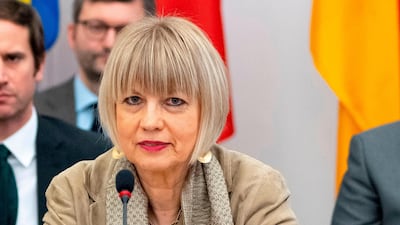German diplomat and EU deputy foreign policy chief Helga Schmid has been named as the new head of the world's largest security body.
The Bavarian, who has served as secretary-general of the EU's European External Action Services (EEAS) since 2016, will leave her position this month when her four-year mandate runs out. She will be the first woman to lead the Organisation for Security and Co-operation in Europe (OSCE), based in Vienna.
The OSCE was established during the Cold War to foster relations between the Soviet and the West. Today it monitors elections, reports on human rights and press freedom, and is engaged in the diplomatic resolution of conflicts, including in Nagorno-Karabakh and Belarus.
The international security body, which represents 57 member states, filled an unprecedented leadership vacuum during virtual meetings on Thursday and Friday, after it failed to reappoint four of its top leaders in July.
US ambassador to the OSCE James Gilmore said Ms Schmid, a career diplomat, was "very well-known in Washington".
The Munich-born diplomat, who also speaks fluent English and French, has been working for the EEAS since its inception in 2010.
Perhaps her most impressive feat was as one of the architects of the Joint Comprehensive Plan of Action – the 2015 nuclear deal between Iran and global powers that froze Tehran's nuclear weapons capability in exchange for the lifting of sanctions. Ms Schmid had been working on the accord since the talks between Tehran and the E3 began in 2003, when she was then-German foreign minister Joschka Fischer's chief of staff.
She later led the US team on nuclear talks with Iran from 2011. Ms Schmid was the lead author of the 100-page treaty which was successfully concluded in 2015.
Western diplomats agree that the technically minded Ms Schmid was one of the key players in the negotiations, helping to hammer out the agreement as well its five annexes.
Despite the deal being under threat, after US President Donald Trump pulled out of it in 2018 and with tensions simmering between Iran and the West, Ms Schmid has said that the signatories have "a collective responsibility" to preserve it.
She has also said any resolution to the Syria crisis could only last if achieved through a political process led by Damascus.
German Foreign Minister Heiko Maas has said Ms Schmid would be "a great asset" to the security bloc because of her negotiating nous and her many years as a seasoned diplomat - it was Mr Maas who recommended her to Chancellor Angela Merkel for the OSCE role in September.
Like the leader of her country, Ms Smidt will become the first woman to fill the position and, as she said in an interview with Politico five years ago, "women are the better negotiators".

